Analysis of IFRS Convergence and Its Effects on CaliFresh's Operations
VerifiedAdded on 2021/02/19
|6
|1230
|52
Report
AI Summary
This report analyzes the convergence of International Financial Reporting Standards (IFRS) and its implications for the United States, particularly in comparison to US Generally Accepted Accounting Principles (GAAP). It explores the pressures from globalization, the Securities and Exchange Commission (SEC), and the global financial crisis that drive the need for convergence. The report highlights the fundamental differences between IFRS and GAAP, which are principle-based versus rule-based, respectively, and their impact on corporate governance, equity markets, and financial professionals. Furthermore, the report examines how IFRS might affect a large Californian food-producer corporation, CaliFresh, specifically focusing on the practical implications of accounting treatments for provisions and inventories. The analysis includes a discussion on the SEC's stance on IFRS and the potential impact on CaliFresh's operational decisions, especially regarding its planned expansion in South Australia. The report also references key academic sources to support its findings.
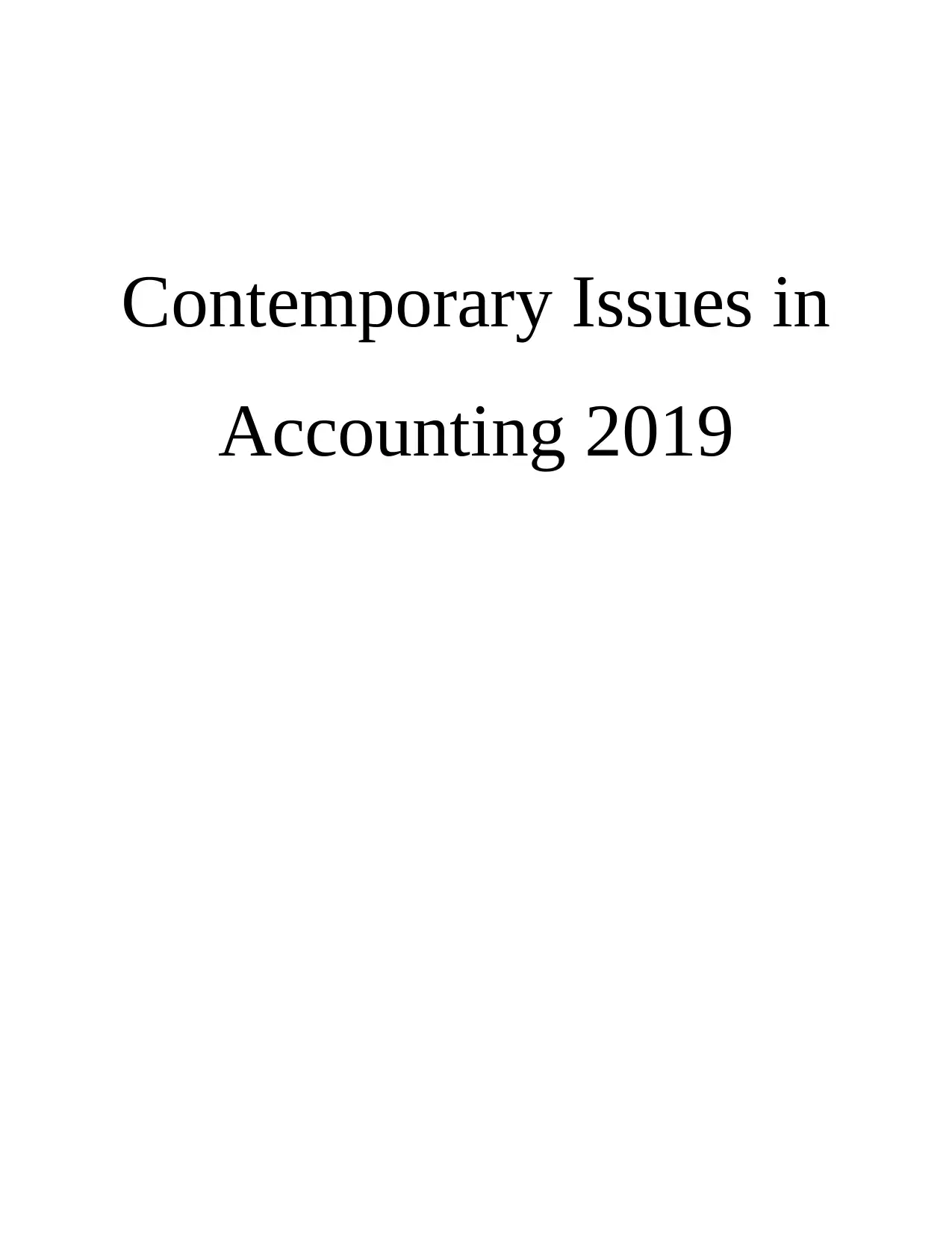
Contemporary Issues in
Accounting 2019
Accounting 2019
Paraphrase This Document
Need a fresh take? Get an instant paraphrase of this document with our AI Paraphraser
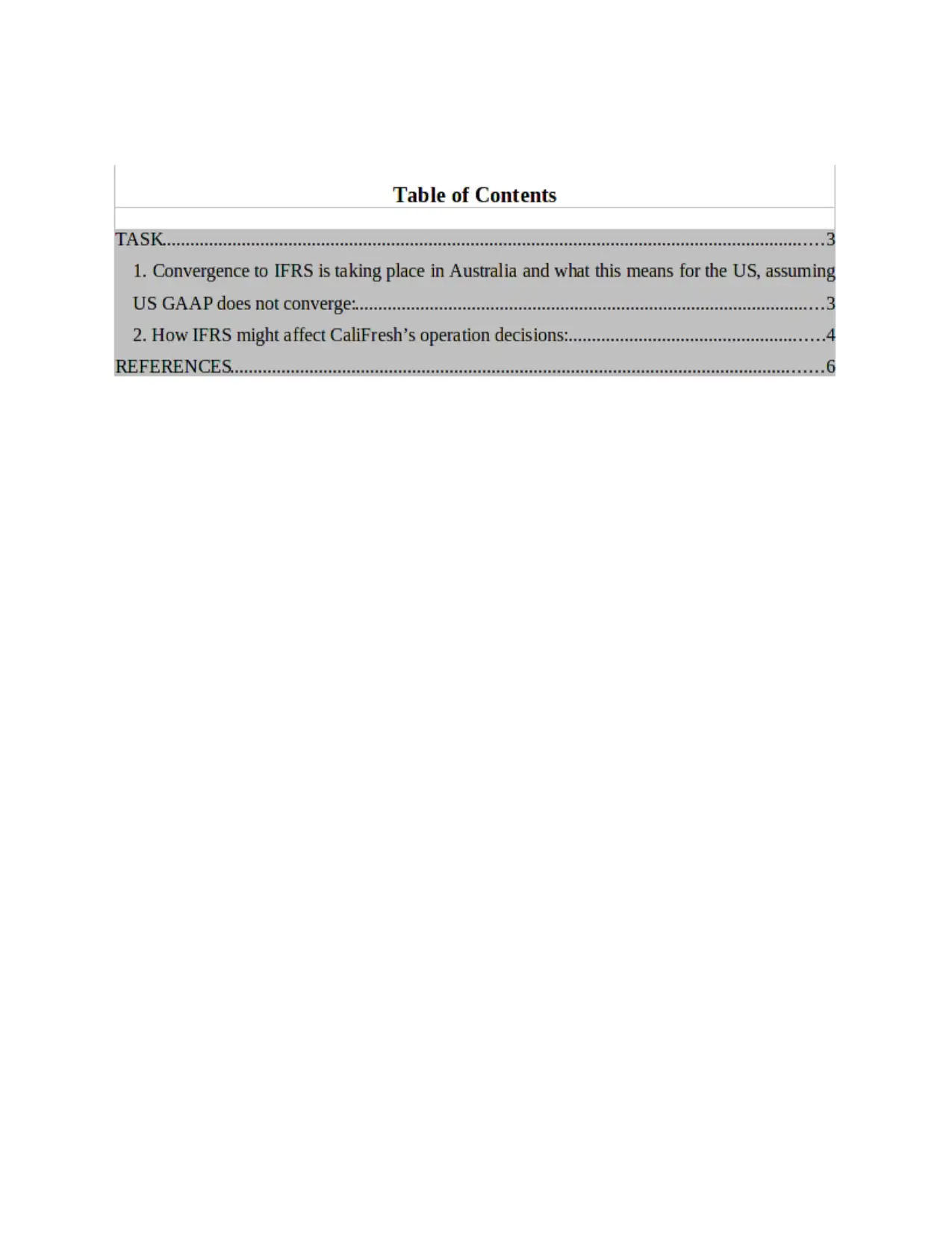
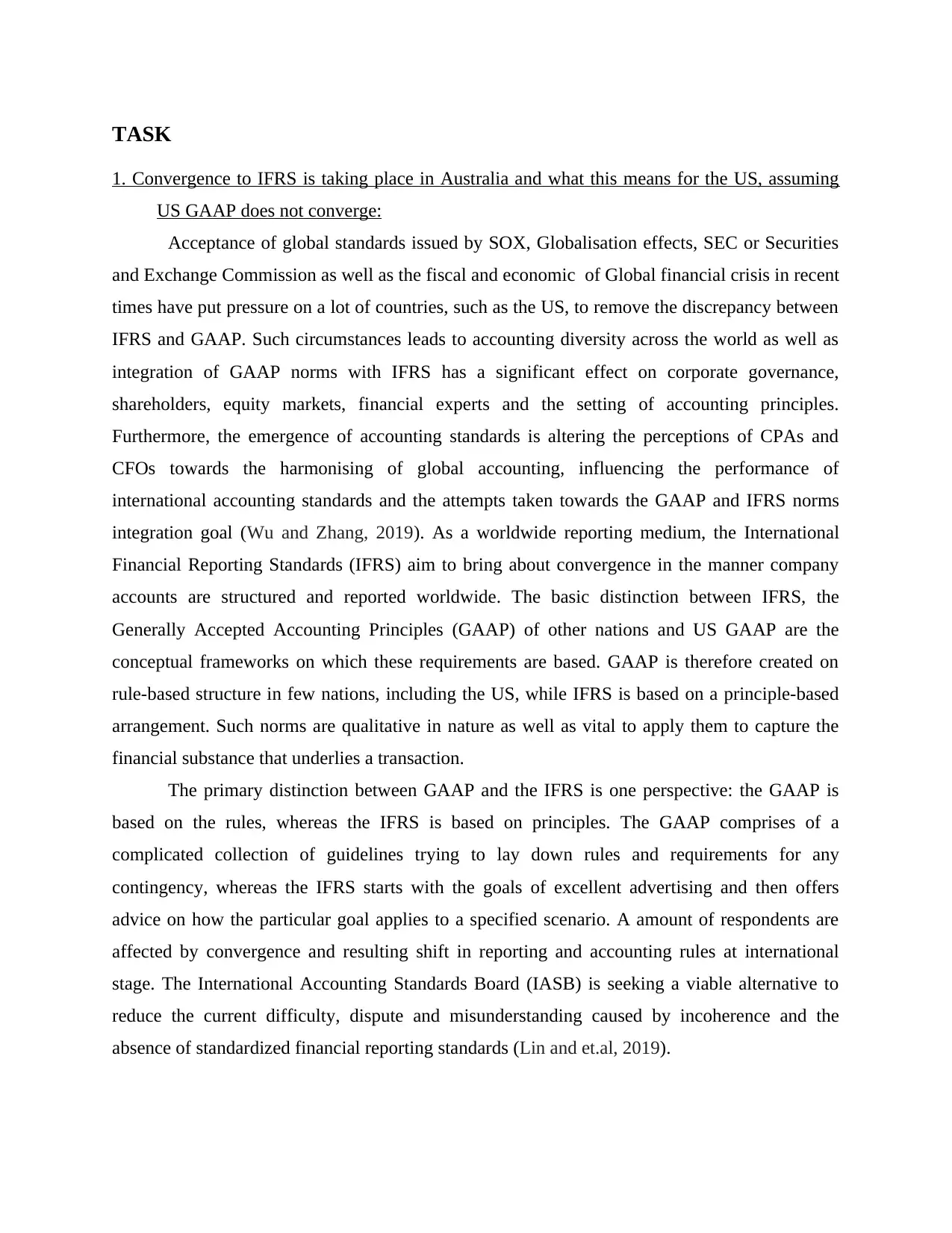
TASK
1. Convergence to IFRS is taking place in Australia and what this means for the US, assuming
US GAAP does not converge:
Acceptance of global standards issued by SOX, Globalisation effects, SEC or Securities
and Exchange Commission as well as the fiscal and economic of Global financial crisis in recent
times have put pressure on a lot of countries, such as the US, to remove the discrepancy between
IFRS and GAAP. Such circumstances leads to accounting diversity across the world as well as
integration of GAAP norms with IFRS has a significant effect on corporate governance,
shareholders, equity markets, financial experts and the setting of accounting principles.
Furthermore, the emergence of accounting standards is altering the perceptions of CPAs and
CFOs towards the harmonising of global accounting, influencing the performance of
international accounting standards and the attempts taken towards the GAAP and IFRS norms
integration goal (Wu and Zhang, 2019). As a worldwide reporting medium, the International
Financial Reporting Standards (IFRS) aim to bring about convergence in the manner company
accounts are structured and reported worldwide. The basic distinction between IFRS, the
Generally Accepted Accounting Principles (GAAP) of other nations and US GAAP are the
conceptual frameworks on which these requirements are based. GAAP is therefore created on
rule-based structure in few nations, including the US, while IFRS is based on a principle-based
arrangement. Such norms are qualitative in nature as well as vital to apply them to capture the
financial substance that underlies a transaction.
The primary distinction between GAAP and the IFRS is one perspective: the GAAP is
based on the rules, whereas the IFRS is based on principles. The GAAP comprises of a
complicated collection of guidelines trying to lay down rules and requirements for any
contingency, whereas the IFRS starts with the goals of excellent advertising and then offers
advice on how the particular goal applies to a specified scenario. A amount of respondents are
affected by convergence and resulting shift in reporting and accounting rules at international
stage. The International Accounting Standards Board (IASB) is seeking a viable alternative to
reduce the current difficulty, dispute and misunderstanding caused by incoherence and the
absence of standardized financial reporting standards (Lin and et.al, 2019).
1. Convergence to IFRS is taking place in Australia and what this means for the US, assuming
US GAAP does not converge:
Acceptance of global standards issued by SOX, Globalisation effects, SEC or Securities
and Exchange Commission as well as the fiscal and economic of Global financial crisis in recent
times have put pressure on a lot of countries, such as the US, to remove the discrepancy between
IFRS and GAAP. Such circumstances leads to accounting diversity across the world as well as
integration of GAAP norms with IFRS has a significant effect on corporate governance,
shareholders, equity markets, financial experts and the setting of accounting principles.
Furthermore, the emergence of accounting standards is altering the perceptions of CPAs and
CFOs towards the harmonising of global accounting, influencing the performance of
international accounting standards and the attempts taken towards the GAAP and IFRS norms
integration goal (Wu and Zhang, 2019). As a worldwide reporting medium, the International
Financial Reporting Standards (IFRS) aim to bring about convergence in the manner company
accounts are structured and reported worldwide. The basic distinction between IFRS, the
Generally Accepted Accounting Principles (GAAP) of other nations and US GAAP are the
conceptual frameworks on which these requirements are based. GAAP is therefore created on
rule-based structure in few nations, including the US, while IFRS is based on a principle-based
arrangement. Such norms are qualitative in nature as well as vital to apply them to capture the
financial substance that underlies a transaction.
The primary distinction between GAAP and the IFRS is one perspective: the GAAP is
based on the rules, whereas the IFRS is based on principles. The GAAP comprises of a
complicated collection of guidelines trying to lay down rules and requirements for any
contingency, whereas the IFRS starts with the goals of excellent advertising and then offers
advice on how the particular goal applies to a specified scenario. A amount of respondents are
affected by convergence and resulting shift in reporting and accounting rules at international
stage. The International Accounting Standards Board (IASB) is seeking a viable alternative to
reduce the current difficulty, dispute and misunderstanding caused by incoherence and the
absence of standardized financial reporting standards (Lin and et.al, 2019).
⊘ This is a preview!⊘
Do you want full access?
Subscribe today to unlock all pages.

Trusted by 1+ million students worldwide
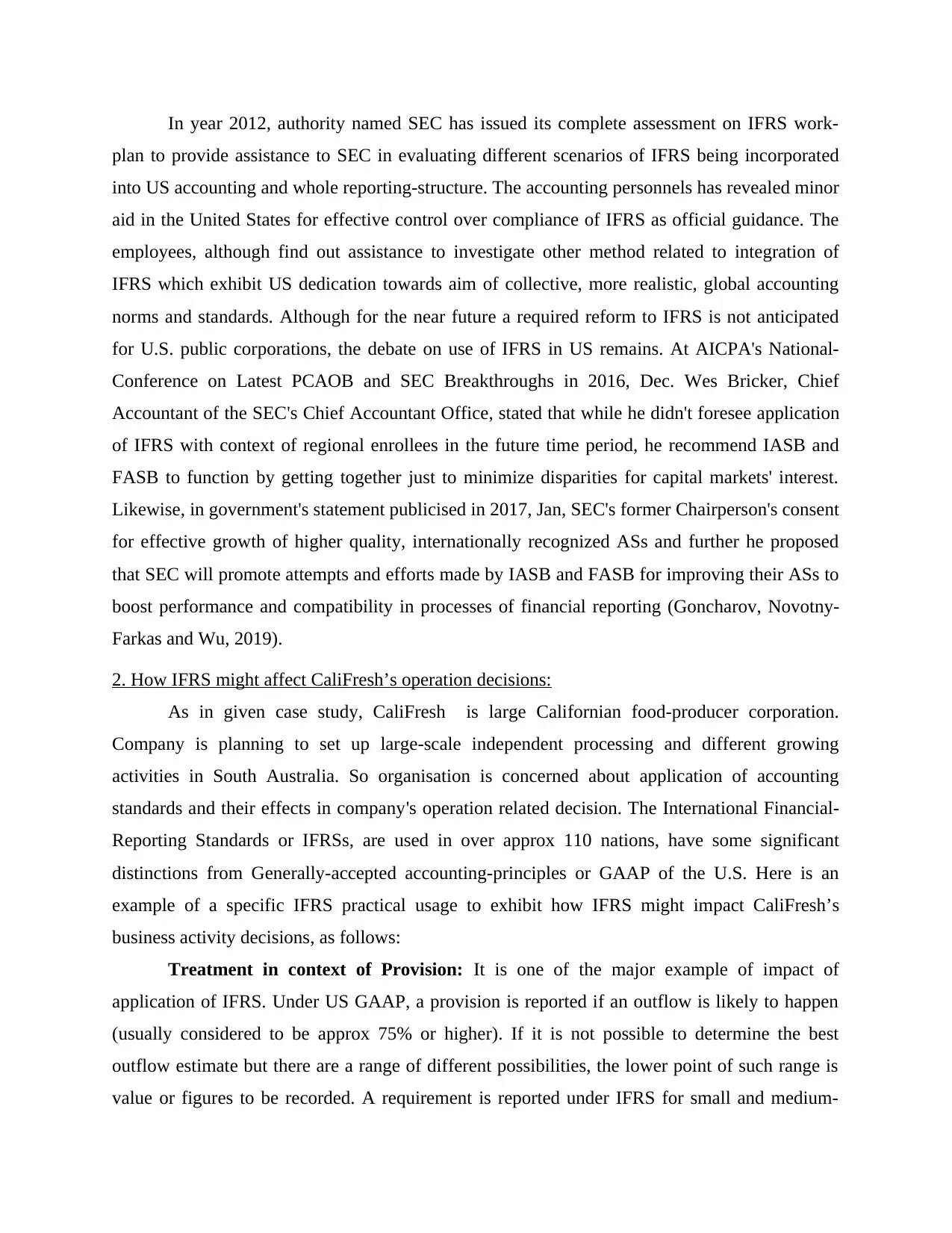
In year 2012, authority named SEC has issued its complete assessment on IFRS work-
plan to provide assistance to SEC in evaluating different scenarios of IFRS being incorporated
into US accounting and whole reporting-structure. The accounting personnels has revealed minor
aid in the United States for effective control over compliance of IFRS as official guidance. The
employees, although find out assistance to investigate other method related to integration of
IFRS which exhibit US dedication towards aim of collective, more realistic, global accounting
norms and standards. Although for the near future a required reform to IFRS is not anticipated
for U.S. public corporations, the debate on use of IFRS in US remains. At AICPA's National-
Conference on Latest PCAOB and SEC Breakthroughs in 2016, Dec. Wes Bricker, Chief
Accountant of the SEC's Chief Accountant Office, stated that while he didn't foresee application
of IFRS with context of regional enrollees in the future time period, he recommend IASB and
FASB to function by getting together just to minimize disparities for capital markets' interest.
Likewise, in government's statement publicised in 2017, Jan, SEC's former Chairperson's consent
for effective growth of higher quality, internationally recognized ASs and further he proposed
that SEC will promote attempts and efforts made by IASB and FASB for improving their ASs to
boost performance and compatibility in processes of financial reporting (Goncharov, Novotny-
Farkas and Wu, 2019).
2. How IFRS might affect CaliFresh’s operation decisions:
As in given case study, CaliFresh is large Californian food-producer corporation.
Company is planning to set up large-scale independent processing and different growing
activities in South Australia. So organisation is concerned about application of accounting
standards and their effects in company's operation related decision. The International Financial-
Reporting Standards or IFRSs, are used in over approx 110 nations, have some significant
distinctions from Generally-accepted accounting-principles or GAAP of the U.S. Here is an
example of a specific IFRS practical usage to exhibit how IFRS might impact CaliFresh’s
business activity decisions, as follows:
Treatment in context of Provision: It is one of the major example of impact of
application of IFRS. Under US GAAP, a provision is reported if an outflow is likely to happen
(usually considered to be approx 75% or higher). If it is not possible to determine the best
outflow estimate but there are a range of different possibilities, the lower point of such range is
value or figures to be recorded. A requirement is reported under IFRS for small and medium-
plan to provide assistance to SEC in evaluating different scenarios of IFRS being incorporated
into US accounting and whole reporting-structure. The accounting personnels has revealed minor
aid in the United States for effective control over compliance of IFRS as official guidance. The
employees, although find out assistance to investigate other method related to integration of
IFRS which exhibit US dedication towards aim of collective, more realistic, global accounting
norms and standards. Although for the near future a required reform to IFRS is not anticipated
for U.S. public corporations, the debate on use of IFRS in US remains. At AICPA's National-
Conference on Latest PCAOB and SEC Breakthroughs in 2016, Dec. Wes Bricker, Chief
Accountant of the SEC's Chief Accountant Office, stated that while he didn't foresee application
of IFRS with context of regional enrollees in the future time period, he recommend IASB and
FASB to function by getting together just to minimize disparities for capital markets' interest.
Likewise, in government's statement publicised in 2017, Jan, SEC's former Chairperson's consent
for effective growth of higher quality, internationally recognized ASs and further he proposed
that SEC will promote attempts and efforts made by IASB and FASB for improving their ASs to
boost performance and compatibility in processes of financial reporting (Goncharov, Novotny-
Farkas and Wu, 2019).
2. How IFRS might affect CaliFresh’s operation decisions:
As in given case study, CaliFresh is large Californian food-producer corporation.
Company is planning to set up large-scale independent processing and different growing
activities in South Australia. So organisation is concerned about application of accounting
standards and their effects in company's operation related decision. The International Financial-
Reporting Standards or IFRSs, are used in over approx 110 nations, have some significant
distinctions from Generally-accepted accounting-principles or GAAP of the U.S. Here is an
example of a specific IFRS practical usage to exhibit how IFRS might impact CaliFresh’s
business activity decisions, as follows:
Treatment in context of Provision: It is one of the major example of impact of
application of IFRS. Under US GAAP, a provision is reported if an outflow is likely to happen
(usually considered to be approx 75% or higher). If it is not possible to determine the best
outflow estimate but there are a range of different possibilities, the lower point of such range is
value or figures to be recorded. A requirement is reported under IFRS for small and medium-
Paraphrase This Document
Need a fresh take? Get an instant paraphrase of this document with our AI Paraphraser
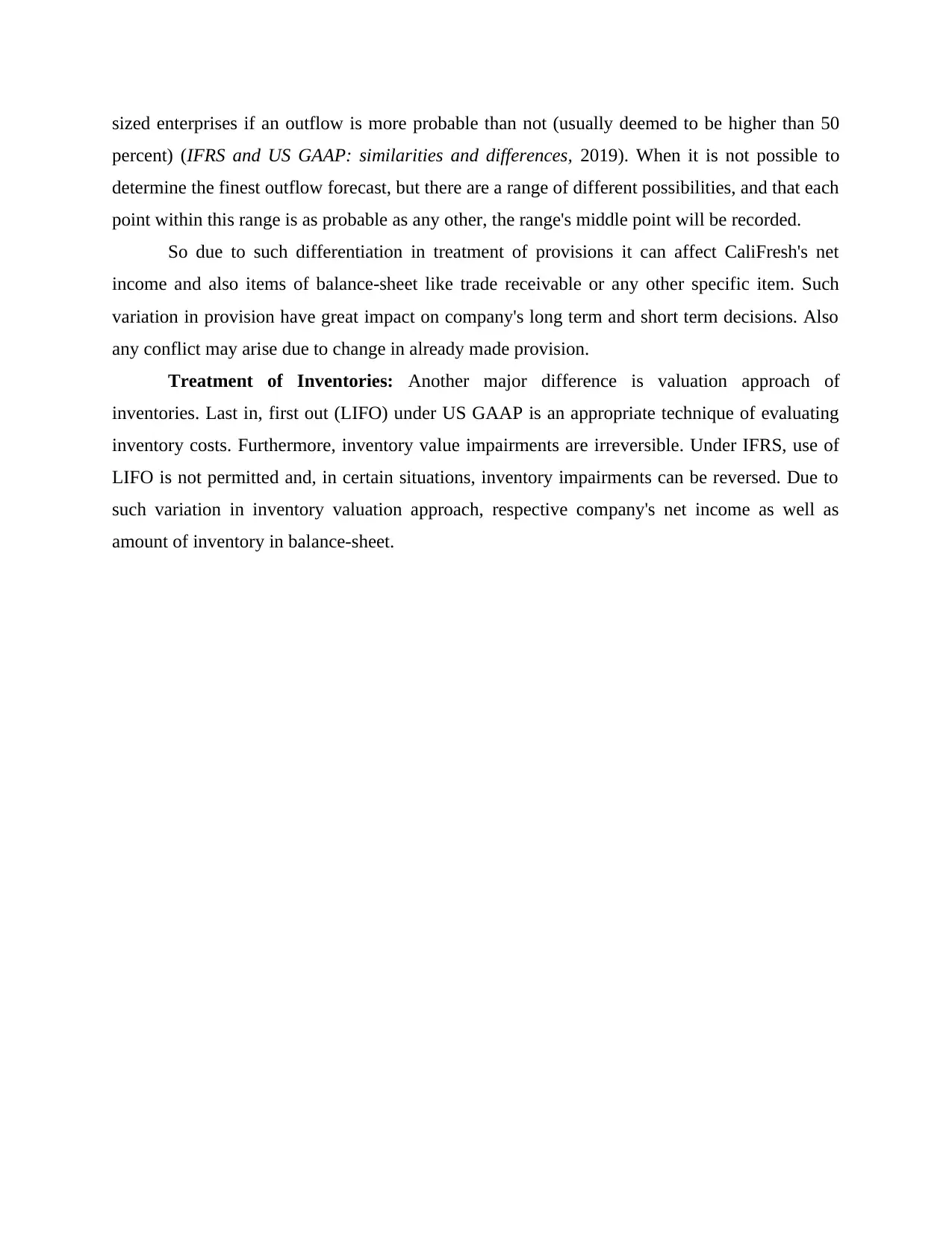
sized enterprises if an outflow is more probable than not (usually deemed to be higher than 50
percent) (IFRS and US GAAP: similarities and differences, 2019). When it is not possible to
determine the finest outflow forecast, but there are a range of different possibilities, and that each
point within this range is as probable as any other, the range's middle point will be recorded.
So due to such differentiation in treatment of provisions it can affect CaliFresh's net
income and also items of balance-sheet like trade receivable or any other specific item. Such
variation in provision have great impact on company's long term and short term decisions. Also
any conflict may arise due to change in already made provision.
Treatment of Inventories: Another major difference is valuation approach of
inventories. Last in, first out (LIFO) under US GAAP is an appropriate technique of evaluating
inventory costs. Furthermore, inventory value impairments are irreversible. Under IFRS, use of
LIFO is not permitted and, in certain situations, inventory impairments can be reversed. Due to
such variation in inventory valuation approach, respective company's net income as well as
amount of inventory in balance-sheet.
percent) (IFRS and US GAAP: similarities and differences, 2019). When it is not possible to
determine the finest outflow forecast, but there are a range of different possibilities, and that each
point within this range is as probable as any other, the range's middle point will be recorded.
So due to such differentiation in treatment of provisions it can affect CaliFresh's net
income and also items of balance-sheet like trade receivable or any other specific item. Such
variation in provision have great impact on company's long term and short term decisions. Also
any conflict may arise due to change in already made provision.
Treatment of Inventories: Another major difference is valuation approach of
inventories. Last in, first out (LIFO) under US GAAP is an appropriate technique of evaluating
inventory costs. Furthermore, inventory value impairments are irreversible. Under IFRS, use of
LIFO is not permitted and, in certain situations, inventory impairments can be reversed. Due to
such variation in inventory valuation approach, respective company's net income as well as
amount of inventory in balance-sheet.
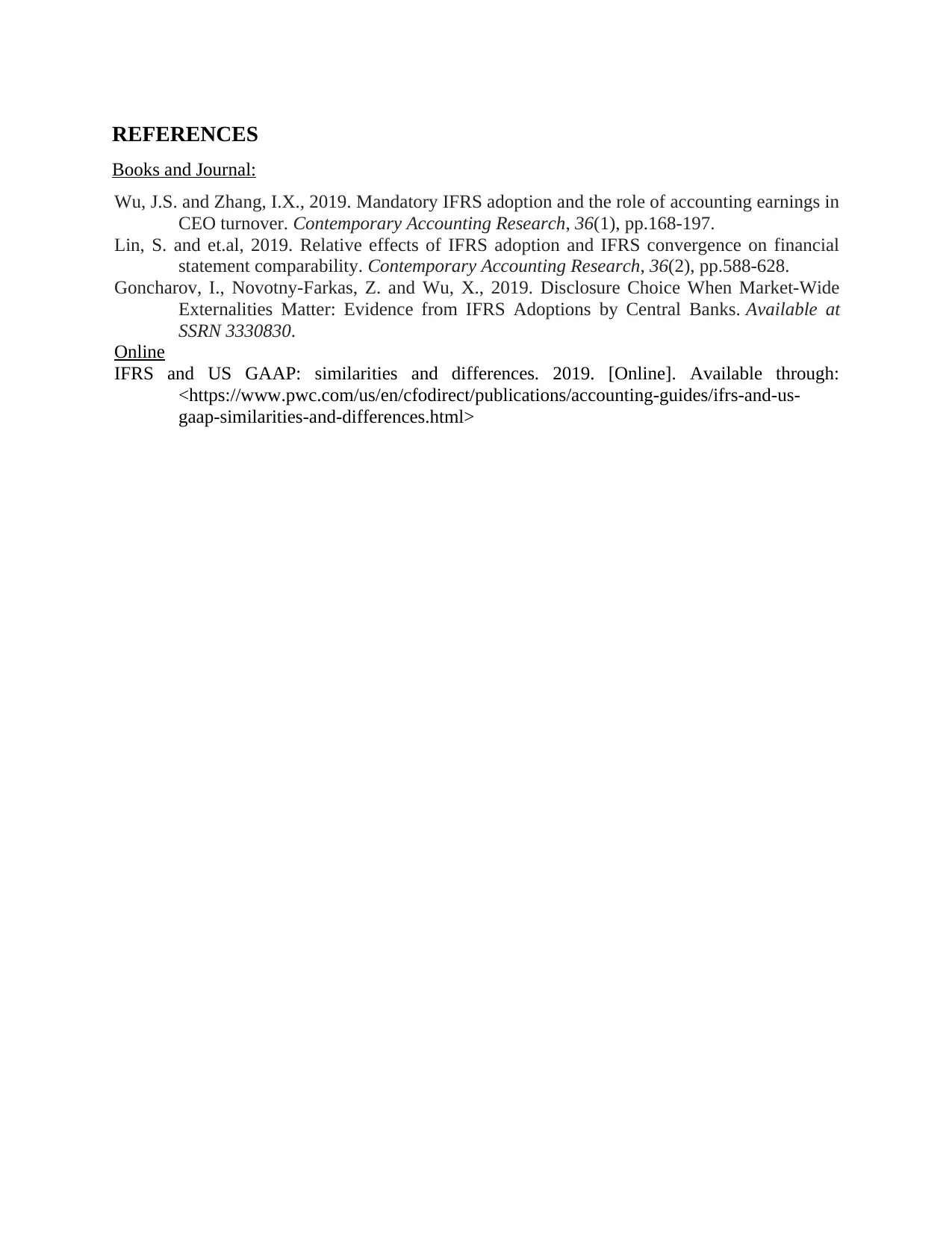
REFERENCES
Books and Journal:
Wu, J.S. and Zhang, I.X., 2019. Mandatory IFRS adoption and the role of accounting earnings in
CEO turnover. Contemporary Accounting Research, 36(1), pp.168-197.
Lin, S. and et.al, 2019. Relative effects of IFRS adoption and IFRS convergence on financial
statement comparability. Contemporary Accounting Research, 36(2), pp.588-628.
Goncharov, I., Novotny-Farkas, Z. and Wu, X., 2019. Disclosure Choice When Market-Wide
Externalities Matter: Evidence from IFRS Adoptions by Central Banks. Available at
SSRN 3330830.
Online
IFRS and US GAAP: similarities and differences. 2019. [Online]. Available through:
<https://www.pwc.com/us/en/cfodirect/publications/accounting-guides/ifrs-and-us-
gaap-similarities-and-differences.html>
Books and Journal:
Wu, J.S. and Zhang, I.X., 2019. Mandatory IFRS adoption and the role of accounting earnings in
CEO turnover. Contemporary Accounting Research, 36(1), pp.168-197.
Lin, S. and et.al, 2019. Relative effects of IFRS adoption and IFRS convergence on financial
statement comparability. Contemporary Accounting Research, 36(2), pp.588-628.
Goncharov, I., Novotny-Farkas, Z. and Wu, X., 2019. Disclosure Choice When Market-Wide
Externalities Matter: Evidence from IFRS Adoptions by Central Banks. Available at
SSRN 3330830.
Online
IFRS and US GAAP: similarities and differences. 2019. [Online]. Available through:
<https://www.pwc.com/us/en/cfodirect/publications/accounting-guides/ifrs-and-us-
gaap-similarities-and-differences.html>
⊘ This is a preview!⊘
Do you want full access?
Subscribe today to unlock all pages.

Trusted by 1+ million students worldwide
1 out of 6
Related Documents
Your All-in-One AI-Powered Toolkit for Academic Success.
+13062052269
info@desklib.com
Available 24*7 on WhatsApp / Email
![[object Object]](/_next/static/media/star-bottom.7253800d.svg)
Unlock your academic potential
Copyright © 2020–2026 A2Z Services. All Rights Reserved. Developed and managed by ZUCOL.





